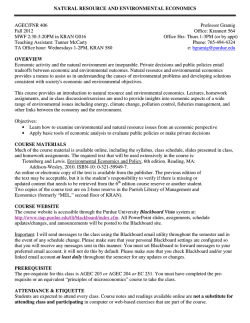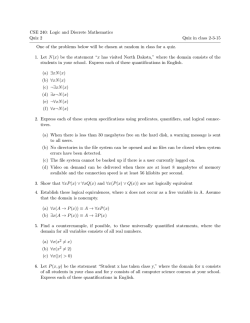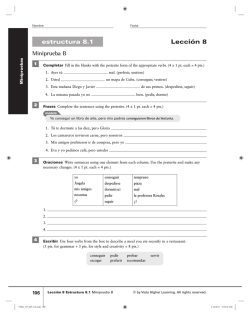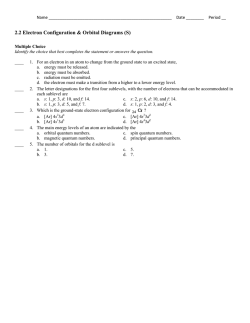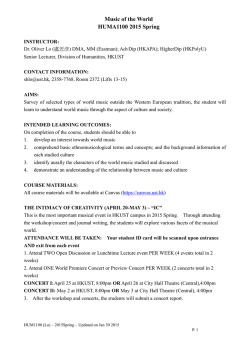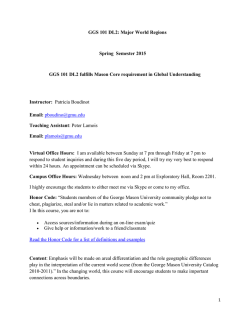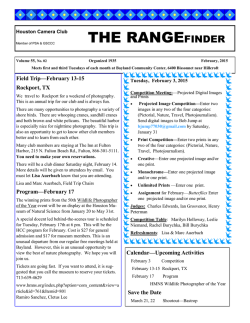
11600B Course Packet - Department of Chemistry
CHM 11600B Course Packet Spring 2015 CHM 11600 B: Dr. Stephen Hoffmann; ARMS 1343, 494-5740, [email protected] (1st 8 weeks) Dr. Cindy Harwood; BRWN 1144F; 494-7012; [email protected] (2nd 8 weeks) Lecture: M/W 2:30 and 3:30 PM Course Coordinator Marybeth Miller, BRWN 1144, phone: 494-5251; [email protected]. Mrs. Miller supervises the lab teaching assistants and maintains all of the grade records for the course. She can address concerns or questions you may have about course policies and procedures. BRWN 1144, The General Chemistry Office, 494-5250 The General Chemistry office handles all the administrative details associated with the course. All non-chemistry questions about the course should be directed to this office. For example, go to BRWN 1144 to get grade checks, to discuss exam conflicts, to get clarification on course policies, to resolve grade issues, to change your schedule (weeks 2 and 3), and to get signatures on university forms such as add/drop forms. Course Coordinator Mrs. Miller and assistants Mrs. Linn and Mrs. Reynolds are able to help you with a variety of requests so you can maximize your success in general chemistry. In CHM 11600, General Chemistry II, the following topics will be covered: • Kinetics and the quantitative application of kinetics concepts to understand the factors that control rates of reaction • Equilibria in chemical reactions, including gas phase reactions, acid-base reactions, heterogeneous reactions, and reactions in solution and the application of quantitative equilibrium concepts to selected chemical reactions • Chemical thermodynamics and the quantitative application of chemical thermodynamics to understand the role of energy transfer in chemical changes • Electrochemical cells and evaluation of the potentials and energy changes associated with reactions in these cells • The relationships between thermodynamics, electrochemistry, and equilibrium. Course Information: Blackboard http://www.itap.purdue.edu/tlt/blackboard Lecture outlines, reading assignments, announcements, and other course information are available on the course Blackboard page. We recommended you visit it often. Foundational Core: This course meets the science requirement of the university's foundational core. Course Learning Objectives will be provided in lecture and on Blackboard. 1 Required Course Materials Textbook: The Molecular Nature of Matter and Change, 6th Edition, Silberberg, ISBN 13 9780073402659 or Purdue University General Chemistry custom edition of Silberberg, ISBN 9781259379567, McGraw-Hill Publishing, 2014 and Connect-Plus access for online homework (included with the custom edition textbook or may be purchased separately online through Blackboard). (If you took CHM 11500 in Fall 2014, you can use the same book and Connect account.) Lab Manual: Chemistry 11600 Laboratory Manual, Purdue University, 2014-2015 Edition, ISBN 978-0-7380-6795-7, Hayden-McNeil Publishing, Inc. Available at campus bookstores. Calculator: A simple battery operated scientific calculator with exponential, logarithm and square root functions is needed for exams. You are NOT allowed to use alpha-numeric, graphing and/or programmable calculators for exams. (Two-line non-programmable calculators are allowed.) Solar calculators do not function well in some areas of the Hall of Music. Approved calculators are available for purchase outside WTHR 200 during the first 2 weeks of class. Lab materials: A padlock for your assigned lab drawer (by week 5) and approved safety goggles, available at the bookstores, outside WTHR 200 during the first two weeks of classes, or from the storeroom on the 1st or 2nd floor in BRWN. Week #1 Assignments: • • • • • • • Purchase required materials (see above). Register for your CONNECT account and begin your first assignment. Attend lab check-in. Attend recitation and lecture. Read all the information in this course packet. Review the Reading Assignments and Learning Objectives (on Blackboard). Complete the safety certification available on the course Blackboard page with a score of at least 20/25 by 11:59 PM on Wed. Jan. 28. You must complete your safety certification before you can work in lab and receive credit for the lab. Weekly Assignments: − − − − − Attend lecture, recitation, and lab. Do the reading assignment for lecture. Complete your Connect homework assignment (due each Monday at 9:59 PM). Complete the concept problems (posted on Blackboard) in preparation for the recitation quiz. Prepare for lab: read the relevant lab manual chapter, do the textbook reading assignment for lab, and complete the pre-lab assignment in preparation for the lab quiz. Late Registration If you register late, notify the Course Coordinator, Mrs. Miller, no later than Fri., Jan. 30 to see about the possibility of making up missed assignments. 2 Overview of CHM 11600 Activities and Policies Studying Chemistry Expect to spend 8-12 hours per week on Chemistry outside of the normal class time. This time includes preparing for lecture, reviewing your notes after lecture, completing homework, reading, lab assignments, and preparing for recitation and lab quizzes. For more advice, see the “Resources” folder on the course Blackboard page. Sources of Help There are several free sources of help for CHM 11600 students, including professor office hours, TA office hours (WTHR 116 C), Supplemental Instruction (SI, www.purdue.edu/SI), PARTE sessions (see below), and the Chemistry Resource Room (WTHR 117 B). Find more information in the “Resources” folder on Blackboard. Reading Refer the lecture schedule on pp. 13-14 and/or your lecture notes for the reading assignments. Reading the assigned material prior to lecture and laboratory is recommended. Some of the material will be covered in lecture and some on your own. Learning objectives (LO) will be posted on Blackboard. Lectures • Student versions of lecture slides may be posted on Blackboard. These are outlines of the lectures and are not a substitute for taking notes in lecture. • Recordings of lectures may be downloaded from the Boilercast website (http://www.itap.purdue.edu/tlt/BoilerCast/) or through the EchoCenter link on Blackboard. • Cell phones, computers, iPods or other electronic devices not being used for instructional purposes are distracting for everyone in a learning situation. Please respect your classmates and turn off your cell phones and iPods in lectures as well as in recitations and labs. Computers can be used to take notes and follow lecture, but you should not be using Facebook, texting, etc. during class. Talking out loud to classmates during lecture is distracting to other students and is disrespectful to the lecturer. If you have a question please ask, but otherwise remain quiet and allow the students around you the opportunity to pay attention. PSO (Optional Friday PARTÉ sessions) During Preparation And Readiness to Take Exams (PARTÉ) sessions you can work exam-type questions with other students and get help from TAs. • PARTE will be held on Fridays in WTHR 200 at the same time as your usual lecture. • Answers will be provided only after you have completed the problems. You may also consult with TAs in office hours to check your work. • PARTÉ sessions are not a time to get help with homework or prelab questions; TA office hours are available for this purpose. 3 Homework (Connect) and Quizzes • Each week you will have one homework assignment on the online Connect system (see Blackboard for the link). Homework will usually be due on Monday at 9:59 pm, 10 days after it is assigned. Due dates will be listed on Blackboard. • You have 2 assignment submission attempts for each Connect homework. Each assignment attempt contains 3 question attempts. You must submit your first assignment attempt to access your second assignment attempt. Your score is the best of the 2 assignment submissions. • Each Connect homework assignment is worth 10 points. The one lowest homework score will be dropped at the end of the semester to account for illnesses, trips, technical difficulties and other situations. • No time extensions are possible for Connect homework assignments. Allow plenty of time to do your homework and get the highest possible score. • Exams are likely to include questions taken from homework assignments. • For technical difficulties with the Connect system, call 1-800-331-5094 or use the online form: http://mpss.mhhe.com/contact.php. Recitation and Concept Problems • Each week a number of concept problems will be assigned and posted on the CHM 11600 Blackboard site (on Fridays, unless otherwise stated). You should plan to work on these problems during the next week. Resources to aid you in completing the problems are lectures, TA office hours, professor office hours and group work with fellow students. • There will be a 10-minute quiz over the concept problems at the beginning of each recitation class. Each recitation quiz is worth 5 points. The lowest recitation quiz score will be dropped at the end of the semester. There are no make-up quizzes. • If you are late for recitation, you will not receive extra time to complete the quiz. • You need to bring a simple, battery-operated scientific calculator and a non-erasable ink pen with you to each recitation quiz. There will be no “spare” calculators available during quizzes and you may not share a calculator with another student. Cell phones and programmable (graphing) or alphanumeric calculators may not be used during quizzes. • After the recitation quiz, there will be time for the class to discuss the solutions to the concept problems. • The remainder of the recitation period will be devoted to answering students’ questions about prelab and homework assignments and preparing for lab. • Quizzes must be written in non-erasable ink to be eligible for regrades. A written request for a regrade, which provides an explanation that the grader can follow, must be submitted to the Course Coordinator, Mrs. Miller, within one week of the date of the quiz. 4 Laboratory Laboratory exercises are an integral part of CHM 11600 and are an opportunity for you to experience in a hands-on way the chemical concepts discussed in lecture. Laboratory Attendance • Lab attendance is required since CHM 11600 is a laboratory course. There are no make-up labs or excused absences, except those covered by the GAPS or MAPS policies (see p. 12). • You are required to complete 10 of the 12 scheduled lab projects to pass the course. If you fail to complete or miss more than 2 lab projects, an automatic grade of “F” will be assigned for the course at the end of the semester. A failure to complete (zero score) will be assigned in the following cases: ⋅ being absent for any reason (except GAPS/MAPS approved absences) ⋅ being dismissed from lab for an incomplete Safety Certification (score <20/25) ⋅ being dismissed from lab for safety violations, including dress and goggle infractions ⋅ arriving more than 10 minutes late ⋅ inadequate preparation that hinders lab participation ⋅ not contributing constructively to the group’s work in lab ⋅ failure to submit a lab report ⋅ not participating in preparation of the lab report • You must complete the online safety certification found on Blackboard with a score of 20/25 or better by 11:59 PM on Wed. Jan. 28. You must confirm your score in the Blackboard grade center. You will receive a zero for each lab you miss due to an incomplete safety certification. Lab Preparation • Before lab, read the experiment and attend recitation to help you prepare. • Complete the pre-lab exercises and prepare an experimental procedure in your lab notebook. • Arrive on time, properly dressed, and prepared for lab work. If you arrive at lab more than 10 minutes late or improperly dressed, you will be asked to leave the lab and will receive a score of zero for that week’s lab and the pre-lab quiz. Lab Quizzes There will be a quiz at the beginning of each laboratory period over the prelab assignment and the lab procedure. The purpose of these quizzes is to ensure your preparation for and safety in lab. • If you score less than 3/5, you will fail the quiz. If you fail the quiz, you may complete the lab experiment, but your score will be 50% of the points earned. If you fail the quiz for the second week in a row, you will not be allowed to perform the experiment and you will be sent home and you will receive a score of zero for the lab. • If you are 1-10 minutes late for lab, you will not receive extra time to complete the quiz. If you arrive more than 10 minutes late, you will not be allowed to complete the quiz or the lab. • Each lab quiz is worth 5 points. The lowest lab quiz score will be dropped at the end of the semester. There are no make-up quizzes. • You need to bring a simple, battery-operated scientific calculator and a non-erasable ink pen with you to each lab quiz. There will be no “spare” calculators available during quizzes and you may not share a calculator with another student. Cell phones and programmable (graphing) or alphanumeric calculators may not be used during quizzes. 5 • Quizzes must be written in non-erasable ink to be eligible for regrades. A written request for a regrade, which provides an explanation that the grader can follow, must be submitted to the Course Coordinator, Mrs. Miller, within one week of the date of the quiz. Lab Safety Students’ safety in the laboratory is a priority and everyone is required to follow the following lab safety regulations, Failure to comply with any of the safety regulations will result in being sent home from lab with a score of zero, which counts as a lab absence. • Proper dress (clothing and shoes) is required. Your clothing must cover you from your neck (collarbone) to your ankles when sitting, standing or reaching. Your feet must be completed covered by your shoes. Your best option for chemistry lab attire is a t-shirt, jeans without holes, and sneakers with socks. If you attend lab in unacceptable attire, you will be sent home and will receive a zero for the lab. Unacceptable clothing includes, but is not limited to: sleeveless or low-cut (i.e. below the collar bone) tops, pants that have holes or rips of any size, cropped pants, shorts, short skirts, open-toed and/or open-heeled shoes, sandals (with or without socks), ballet flats, or slippers. In short, your skin must be covered from your collarbone down to your feet. • Goggles are required at all times in the laboratory, including during report-writing and lab check-out. If you are in lab and your goggles are not covering your eyes, you will be sent home and will receive a zero for the lab report and lab quiz. This includes the period of time during which you are writing the lab report. • Wear gloves when specified. • Food and beverages (including water bottles) are never allowed in the labs. • All backpacks, coats and other personal belongings must be placed on the coat rack. • If your hair is longer than shoulder length you must tie it behind your head. • Contact lens wearers are encouraged to wear glasses in the laboratory. 6 • Follow your instructor’s guidance on appropriate handling of hazardous materials and disposal of chemical waste. • Promptly clean up spills and tidy the laboratory before leaving. Lab Reports • Complete the lab report appropriately: o Use pen and write neatly. o Label graphs and tables. o Use the data your team collected for the calculations and analysis. o Use correct units of measurement and significant figures. o Use chemical terms and concepts correctly. o Ensure results and conclusions are consistent with your data and observations. • Endeavor to work as an effective member of a team. Upon completion of each lab project, you will be required to complete a Peer and Self Evaluation form. Your TA will use your completed evaluation as well as those completed by your lab partner(s) to calculate your score for the lab project. If you come to lab unprepared, don’t carry your fair share of the load and/or don’t do what you are supposed to do, you will receive a lower score for the lab project. • Lab reports are due before leaving lab the day lab work is completed and the lab is closed, that is 10:20 AM, 2:20 PM or 5:40 PM. Lab reports submitted up to 24 hours late are worth 50%. Lab reports submitted after 24 hours are worth no (zero) credit. • Graded lab reports will be returned one week after they are submitted. It is suggested that all lab partners review the graded report, as exams will likely include lab-related questions. If you have questions about a lab report grade, speak with your lab instructor (TA) or the Course Coordinator (Mrs. Miller) within one week of the report being returned to you. Your report must be completed in pen to be eligible for a regrade. 7 Exams Exams are a chance for you to demonstrate your comprehension of the course material and are worth approximately 50% of your final grade. Your lowest exam score or ½ your final exam score will be dropped at the end of the semester. Spring 2015 hour exam schedule: Exam I: Wed., Feb 11, 2015 Exam II: Wed., Mar. 11, 2015 Exam III: Tue., Apr. 07, 2015 6:30 p.m. – 7:30 p.m. 6:30 p.m. – 7:30 p.m. 6:30 p.m. – 7:30 p.m. Elliott Hall of Music Elliott Hall of Music Elliott Hall of Music Final Exam: time and place to be announced – see below • Attendance at exams is required. There are NO make-up exams and absences are not excused except those covered by the GAPS/MAPS policies (see p. 12). If you are absent for one exam, your score will appear as a zero until the end of the semester, at which time one zero score can be dropped. You will receive no score (zero points) for additional missed exams. • If you have a direct conflict with another exam, class, or required university activity, contact the General Chemistry office (BRWN 1144) at least one week before the conflict. You will be asked to provide written verification of the conflict. If an emergency occurs, contact the General Chemistry office (BRWN 1144) as soon as possible. • Hour exams are one hour in length. You should arrive at least 15 minutes before the exam start time. If you arrive more than 15 minutes after the exam start time, you will not be allowed to take the exam. • Exams are given in the Elliot Hall of Music. Before Exam I, you will receive an exam seat assignment (level, aisle, row, and seat) for the entire semester. Take your PU ID, your seat assignment, an appropriate (non-graphing) calculator (see details on p. 2), and #2 lead pencils with you to the exam. You may not share a calculator with another student. Final Exam • The final exam is a 2-hour comprehensive exam. The time and place will be announced midsemester. • Wait until you know the date of the final exam before you make travel plans that might conflict with the exam. Final exams will NOT be rescheduled to accommodate your travel plans. • University policy on Final Exams states: “Students scheduled for more than two (final) examinations in one calendar day are entitled to reschedule any examination in excess of two. . .. It is the responsibility of the student to make necessary arrangements before the last week of regularly scheduled classes.” 8 Determining your Course Grade, Spring 2015 Each of the assigned course activities for CHM 11600 is worth the number of points listed below. Before course grades are finalized at the end of the semester the following scores will be dropped: o Lowest homework score o Lowest recitation quiz score o Lowest lab score, provided o Lowest lab quiz score you have completed at least 10/12 labs (the 15-point Week 2 exercise cannot be dropped) o Lowest exam score or ½ your final exam score, whichever is lower The total number of points for CHM 11600 will be distributed as follows: Exams I - III 375 pts. (3 at 125 pts. each) Final Exam 250 pts. (comprehensive) Homework 140 pts. (best 14 of 15 at 10 pts. each) Quizzes 55 pts. (best 11 of 12 at 5 pts. each) (recitation – concept problems) Quizzes (lab) 50 pts. (best 10 of 11 at 5 pts. each) Labs Sub-total Drop Total 275 pts. (best 10 of 11 (Labs 2-12) at 25 pts. each + Lab 1 (15 pts) + Course Policy Review exercise (10 pts)) 1145 pts. -125 pts. drop lowest exam or ½ final exam score, whichever is less 1020 pts. If you miss more than 2 labs during Weeks 2-15 (Labs 1-12) your course grade will automatically be an F. Except for approved GAPS or MAPS leaves, there are NO EXCUSED ABSENCES in CHM 11600. The point total available for exams is 500 (4 x 125). Your dropped exam score will be determined as follows: Your points earned on the Final Exam will be divided in half and considered as separate scores, T4 and T5. These scores will be compared with your scores on Exams 1-3 (T1, T2, and T3) and the lowest of these 5 scores will be dropped (i.e. not counted into your total points). At the end of the semester, the total scores for all students will be arranged in numerical order, the score that corresponds to either the 99th percentile (S 99 ) will be determined, and then letter grades will be assigned based on this percentile score as follows: A: B: C: D: F: Total Score ≥ 0.90 x S 99 0.80 x S 99 ≤ Total Score < 0.90 x S 99 0.70 x S 99 ≤ Total Score < 0.80 x S 99 0.60 x S 99 ≤ Total Score < 0.70 x S 99 Total Score < 0.60 x S 99 or if you fail to complete 10 of the 12 lab projects 9 At various times during the semester, this approach will be used to create tentative grading scales which you can use to see how well you are doing in the course. This system has several advantages. It lets you know several times during the semester how you are doing in the course. Unlike a curved scale, it encourages cooperation among students because no student is penalized when another is successful. Unlike an absolute scale, it tends to neutralize the effects of differences from one semester to another and thereby ensures that the same criteria are used to assign grades from one semester to another. This approach to grading means that the grade you get in this course depends primarily on your own effort and performance. It also ensures that all students who do well in the course will get good grades. • Check all your grades on Blackboard after each exam. If there are any errors or discrepancies, notify the Course Coordinator, Mrs. Miller, within 2 weeks of the exam. • Save all returned graded papers and your exams until after you have received your course letter grade for CHM 11600. To resolve any discrepancies, your paper(s) will need to be reviewed. 10 Administrative Policies Emergencies In the event of a major campus emergency, course requirements, deadlines and grading percentages are subject to changes that may be necessitated by a revised semester calendar or other circumstances beyond the instructor’s control. Relevant changes to this course will be posted on the course Blackboard site or can be obtained by contacting the instructors or TAs via email or the General Chemistry office via phone at 765-494-5250. You are expected to read your @purdue.edu email on a frequent basis. • “Shelter in Place” means seeking immediate shelter inside a building or University residence. This course of action may need to be taken during a tornado, earthquake, release of hazardous materials in the outside air, active shooter, building intruder, or a civil disturbance. If you hear the All Hazards Outdoors Emergency Warning Sirens or are notified via text or other means, immediately go inside a building to a safe location and use all communication means available to find out more details about the emergency. Remain in place until police, fire, or other emergency response personnel provide additional guidance or tell you it is safe to leave. There is no “all safe siren;” the notification will come via text, internet, or email announcement. • In the case of a major campus emergency involving a shelter-in-place, all laboratory experiments will be halted while students shelter in lab. Students’ lab grades will not be penalized in this situation. Absences • Verified grief and military absences are the only excused absences in CHM 11600. Students who experience the death of a family member or close friend and students who are called into military service should contact the Office of the Dean of Students at 765-494-1747. • The lowest score in each category (lab, HW, quiz, exam) is dropped at the end of the semester to account for other types of absence, such as those due to illnesses, trips or conflicts. If you have concerns about absences affecting your course grade, contact your instructor at the time of the absence. • If you experiences an absence that is expected to be for an extended period of time (normally a week or more), you should contact the Office of the Dean of Students at 765-494-1747. A member of the Dean of Students staff will notify the student’s instructor(s) of the circumstances. The student should be aware that this intervention does not change in any way the outcome of the instructor’s decision regarding the students’ academic work and performance in any given course. Academic Integrity All students are expected to be familiar with Purdue’s policies on academic integrity (https://www.purdue.edu/odos/osrr/academic-integrity-brochure/). Consequences of academic dishonesty include receiving a lower or failing grade for an assignment, being required to repeat the assignment, and/or receiving a lower or failing grade for the course. 11 Changing Sections/Adding/Dropping UNIVERSITY DEADLINES – Spring 2015 Mon. Jan. 26: Last day to cancel (drop) a course without it appearing on your record. Mon. Feb. 9: Last day to cancel (drop) a course without a grade. Mon. Mar. 23: Last day to cancel (drop) a course (with a passing or failing grade). CHEMISTRY DEPARTMENT DEADLINES – SPRING 2015 Mon Jan. 19: LAST day to add chemistry or switch lab sections without instructor approval Fri. Jan. 30: LAST day to switch lab sections or LAST day to add CHM 11600 (if not enrolled in another CHM course) Fri. Feb. 6: LAST day to switch from another CHM course to CHM 11600 (subject to instructor approval) Late Registration If you register late, notify the Course Coordinator, Mrs. Miller, no later than Fri., Jan. 30 to see about the possibility of making up missed assignments. Lab Drawer Check-Out If you drop CHM 11600 after having checked into a lab drawer, it is your responsibility to check-out of your assigned drawer during your scheduled lab period. Failure to check-out of lab will result in your padlock being cut, a $45 fee, and forfeiture of the right to determine the acceptability of all locker drawer equipment. If you change sections after you check into a locker drawer, you must check out of your old locker drawer before checking into a drawer in your new section. Disability Accommodations If you require accommodations to access course activities or materials, the accommodations must be described and approved by the Disability Resource Center, Young Hall Room 830, 302 Wood Street, 494-1247, www.purdue.edu/drc. To implement accommodations you must follow the instructions in the letter prepared by the Disability Resource Center. Take a copy of this letter to the Course Coordinator in BRWN 1144 within the first three (3) weeks of the semester or within one week of the date of the letter to discuss your accommodations. Timely notification of the Course Coordinator is critical for timely implementation. Grief Absence Policy for Students (GAPS) If you experience the death of a family member or close friend, notify the Office of the Dean of Students at 765-494-1747. Scores for any missed assignments under a verified GAPS absence will be prorated (assigned a score based on your average and the class average). See the Course Coordinator (Mrs. Miller) for more information. Military Absence Policy for Students (MAPS) If you are required to complete mandatory military service, notify the Office of the Dean of Students (ODOS) at 765-494-1747 to request that a notice of the leave be sent to instructors. See the Course Coordinator (Marybeth Miller) for more information. ***For additional information about Purdue University Policies, Sources of Help, Ways to Study Chemistry, and Safety Policies, see the “Course Information” folder on the course Blackboard page or the insert in your Purdue custom edition textbook. *** 12 Week Date Lecture 1 12-Jan 1 Introduction to CHM 11600 14-Jan 2 Concentration Expressions, Kinetics 2 3 19-Jan 5 6 7 8 Textbook Week Chapter/Section Course Packet 1 3.5, 13.5, CH 16 NO CLASSES (MLK Day) CH 16 21-Jan 3 Kinetics CH 16 26-Jan 4 Kinetics CH 16 28-Jan 5 Kinetics CH 16 30-Jan 4 Lecture Topic 6 Kinetics CH 16 4-Feb 7 Equilibrium CH 17 9-Feb 8 Equilibrium CH 17 11-Feb 9 Equilibrium CH 17 16-Feb 10 Acids and Bases CH 4, 18 18-Feb 11 Acids and Bases CH 4, 18 23-Feb 12 Acids and Bases CH 4, 18 25-Feb 13 Acid-Base Equilibria CH 18 2-Mar 14 Acid-Base Equilibria CH 18 4-Mar 15 Acid-Base Equilibria CH 18 Lab Reading Assignment Exams Check-in; Review of Course Policies - 10 pts; Cooperative Work Agreement 2 Lab 1: Observing, Recording and Communicating Experimental Information - 15 pts (cannot be dropped) 3 Lab 2: A Chemical Oscillation Reaction - textbook 3.5, 25 pts (CH 3; review Appendix B & C) 13.5 **Safety Certification (due Jan. 28 at 11:59 PM) must be completed (min. 20/25) before working in lab** First PARTÉ session (held every Friday in WTHR 200) 2-Feb Lab (Lab Manual Chapter) 4 Lab 3: Chemical Kinetics, Part I (Rate Law) - 25 pts (CH 4; review CH 1 & Appendix D) textbook CH 16 5 Lab 4: Chemical Kinetics, Part II (Activation Energy) - 25 pts (CH 4; review CH 1 & Appendix D) textbook CH 16 6 7 8 13 Lab 5: Bromocresol Green Equilibrium Systems - 25 pts (CH 5; review Appendix C & D) textbook CH 17 Lab 6: Iron(III) Thiocyanate Equilibrium System - 25 pts (CH 6; review CH 1 & Appendix D) textbook CH 17 No Lab compensation for evening exams Exam I Wed Feb 11 6:30 PM Lecture Topic Textbook Chapter/Section Week Week Date Lecture 9 9-Mar 16 Acid-Base Buffers 19.1 11-Mar 17 Acid-Base Titrations 19.2 9 SPRING BREAK (Mar. 16-20) 11 23-Mar 18 Enthalpy and Thermochemistry CH 6 25-Mar 19 Enthalpy and Thermochemistry CH 6 12 30-Mar 1-Apr 20 21 Enthalpy and Thermochemistry Enthalpy and Thermochemistry CH 6 CH 6 11 13 6-Apr 22 Spontaneity and Entropy Sect. 20.1 12 8-Apr 23 Entropy Changes Sect. 20.2 13-Apr 24 Gibbs Free Energy; Thermodynamics and Equilibrium 20.3, 20.4 15-Apr 25 Redox Chemistry 20-Apr 26 Electrochemical Cells Sect. 21.1, 21.2 22-Apr 27 Electrode Potentials Sect. 21.3, 21.5 27-Apr 28 Electrochemistry and Thermodynamics Sect. 21.4 29-Apr 29 Electrolysis Sect. 21.7 15 16 Lab 7: Acid-Base Equilibria (Part I) 25 pts Lab Reading Assignment textbook 19.2, CH 18 Exams Exam II Wed Mar 11 6:30 PM (CH 8) 10 14 Lab (Lab Manual Chapter) 10 Lab 8: Acid-Base Equilibria (Part II) 25 pts (CH 8) textbook 19.2, CH 18 Lab 9: Enthalpy: Hess' Law - 25 pts (CH 9) textbook CH 6 Lab 10: Thermodynamics and Equilibrium - 25 pts textbook 13.4, CH 20 Exam III Tue Apr 7 6:30 PM (CH 10) 13 textbook 4.5, 4.6 Oxidizing Agents and Reducing Agents 25 pts ((CH 11) Sect. 4.5, 4.6 14 Lab 12: A Metal Ion Sensor - 25 pts textbook CH 21 (CH 12) 15 Final Exam Week: May 4-9 Lab 11: Oxidation-Reductions Reactions/ Lab Check-out (You must attend or be charged a $45 failure-to-check-out fee.) Final Exam TBA Do NOT make travel plans until you know the date of the final exam. 14
© Copyright 2026
